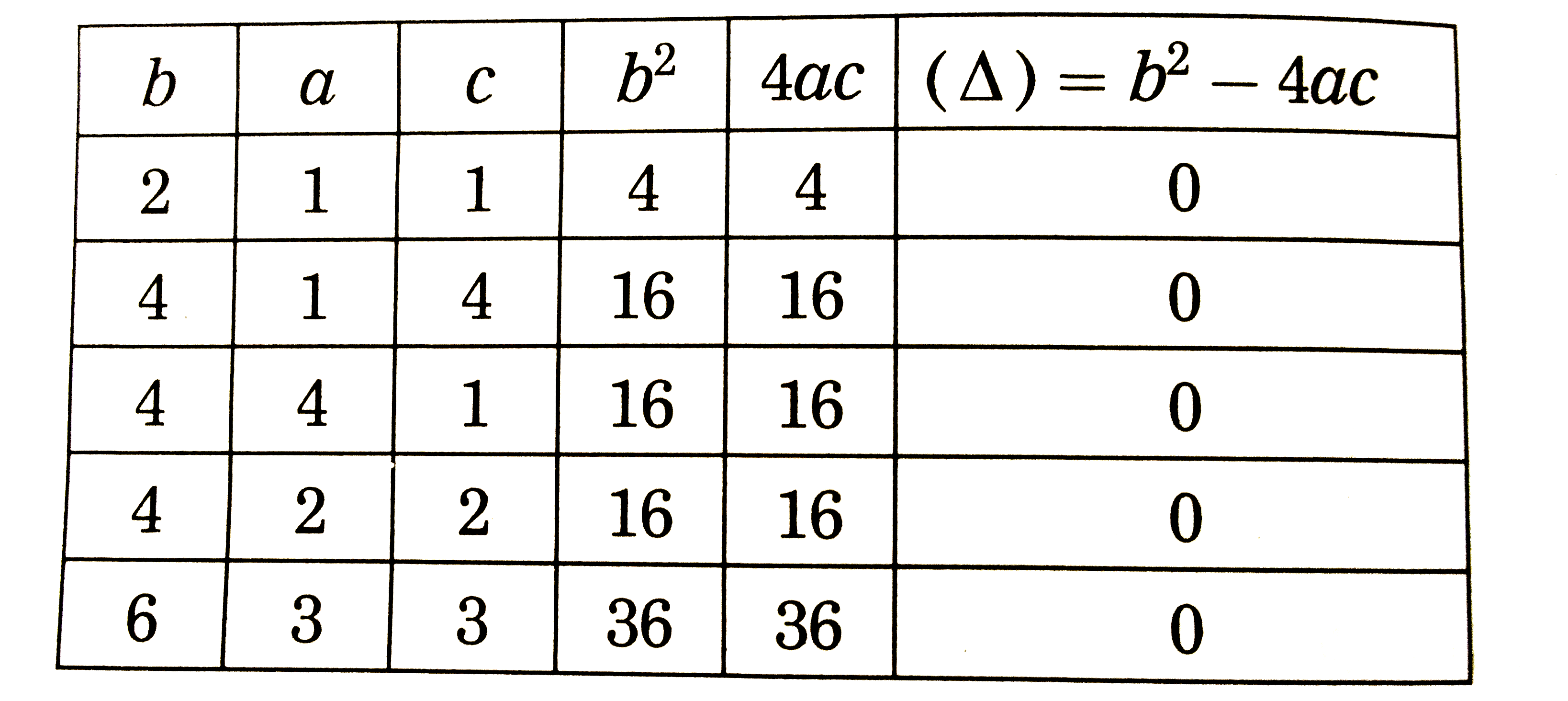Each coefficient in the equation ax2+bx+c=0 is obtained by rolling a die. Find the probability that the equation has equal roots.
The three coefficient a,b and c are determined by rolling a die three times.
Each die has six possibilities.
∴ the sample space has 6×6×6=216 points.
∴n(S)=216
Let A be the event that the equation has equal roots.
Then the discriminant (Δ)=b2−4ac=0.

A={(2,1,1),(4,1,4),(4,4,1),(4,2,2),(6,3,3)}
:n(A)=5
∴P(A)=n(A)n(S)∴P(A)=5216
Ans. The probability that the equation ax2+bx+c=0 has equal roots is 5216.
Topper's Solved these Questions
- CHALLENGING QUESTIONS Book:NAVNEET PUBLICATION - MAHARASHTRA BOARDChapter:CHALLENGING QUESTIONS Exercise:EXAMPLE FOR PRACTICE
Explore 22 Videos
- BOARD'S QUESTION PAPER : MARCH 2019Book:NAVNEET PUBLICATION - MAHARASHTRA BOARDChapter:BOARD'S QUESTION PAPER : MARCH 2019Exercise:QUESTION
Explore 30 Videos
- CHALLENGING QUESTIONSBook:NAVNEET PUBLICATION - MAHARASHTRA BOARDChapter:CHALLENGING QUESTIONSExercise:SECTION 3 (MODEL QUESTION PAPER FOR PRACTICE ) Solve any one of the following subquestions :
Explore 1 Video
Similar Questions
Each coefficient in the equation ax2+bx+c=0is determined by throwing ordinary six faced die. Find the probability that the equation will have real roots.
View SolutionEach coefficient in the equation ax2+bx+c=0is determined by throwing ordinary six faced die. Find the probability that the equation will have real roots.
View Solution
Knowledge Check
If a sum of money double itself in 4 years at S.I. then the rate of interest per annum is?
Aa. 25%Bb. 100%Cc. 50%Dd. none of theseThe coefficients a, b and c of the quadratic equation, ax2+bx+c=0 are obtained by throwing a dice three times. The probability that this equation has equal roots is:
A172B5216C136D154If 'head' means one and 'tail' means two,then coefficient of quadratic equation ax2+bx+c=0 are chosen by tossing three fair coins. The probability that roots of the equating are imaginary is
A5/8B3/8C7/8D1/8.
Each coefficient in the equation ax2+bx+c=0 is determined by throwing an ordinary six faced die. Find the probability that the equation will have real roots.
View SolutionEach coefficient in the equation ax2+bx+c=0 is determined by throwing an ordinary six faced die. Find the probability that the equation will have real roots.
View SolutionEach coefficient in the equation ax2+bx+c=0 is determined by throwing an ordinary die.
Q. The probability that roots of quadratics are real and district, is
View SolutionEach coefficient in the equation ax2+bx+c=0 is determined by throwing an ordinary die.
Q. The probability that roots of quadratic are real and distinct, is
View SolutionEach coefficient in the equation ax2+bx+c=0 is determined by throwing an ordinary die.
Q. The probability that roots of quadratic are imaginary, is
View Solution

